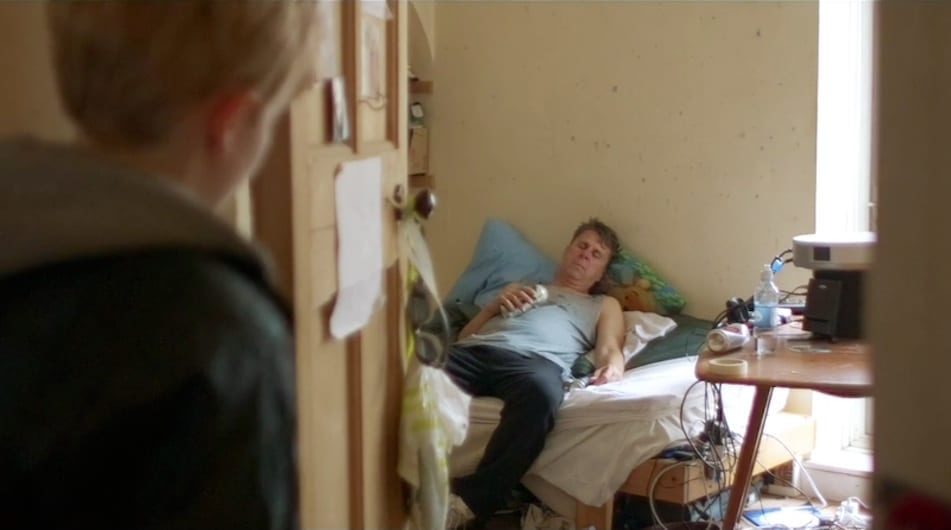Escape is a mesmerizing reflection of a boy’s rather harsh experience. How did the idea come about – did you write the narrative?
Escape, was a short I wrote 18 months ago, I didn’t have any particular inspiration, but I think at the time I was writing it I wanted to create a real human story, which for a lot of children was something quite real and then bring in the fantasy element which was more like a visual metaphor for hope.
What were the main challenges of making the film and how did you resolve them?
My main challenges on this project was working with a limited amount of resources in terms of kit, I was able to overcome this by being creative for the most with what I had and making compromises which would overall still give me the same outcome as I desired.
What was behind your decision to use this particular soundtrack – it’s very effective in tone and pace when you could easily have chosen something overly dramatic? Please tell us how the music evolved.
The first cut had a temp track which I loved and thought worked well, but I knew I wanted something original so I shared the edit with Paul Fincham a composer I had worked with previously. We had a music session and the key thing I wanted was something beautiful, something that helped drive the story that was also calm and gentle.
Paul sent me something that absolutely blew my mind, so much so that I completely forgot about the temp tracks I had on there and for anyone that’s done editing they’ll know how easy it is to fall in love with what you have done in the first cut, especially if it takes a lot of time to do. But when you’re given something fresh, that easily overpowers what’s come before then you know what’s new is definitely great.
You managed to get a wonderful performance out of the boy – how did you cast him and what was the creative process with him, were there lots of rehearsals prior to shooting?
I held a casting last year and funny enough when I wrote the script I originally described him as a boy with ginger hair and freckles, but Francis came along and he didn’t have ginger hair but that didn’t matter. The way he took direction surprised me, he understood exactly what I wanted, so based on that I decided extra rehearsals weren’t going to be necessary. Also I didn’t want it over rehearsed, Francis had something raw which I didn’t want to lose. I wanted any direction that I gave him on set to be fresh in his mind and not something he had been practicing up until production and that’s why I think his performance translated so well on screen.
You seem to be adept at working with CGI as well as live action. Do you collaborate with VFX artists? (See here for more CGI work by Michael Adeyeye)
I wish! I would love to work with VFX artists, but what I discovered very quickly was every visual effects graduate would rather work for a major VFX house than with a non-established director from Hackney, which sounds harsh but it’s true and to be honest I didn’t have any funding to budget in VFX work.
So over the last five years I’ve taught myself all the visual effects skills most artists have. I’ve not just learnt how to do them but hopefully they’re to the same standard and quality, to make myself a strong option for my own projects.
Please give us the elevator version of your biography and what led you to film making. Did you go to film school or are you self-taught?
Yes, I’m self taught. I discovered I wanted to make films when I was 16-17 but I didn’t know where to start or how to go about this, so I spent serval weeks or months looking online for advice and watching behind the scenes bonus features from dvds until I got so excited and realised that there was a way to do this without going to a course or doing a degree which I was certain would make me hate what I knew I loved.
So by the time I was almost 18 I sat down and thoroughly planned the next 10 years of my life and there the journey began. When I was in college I used to get EMA (Education Maintenance Allowance) which was £30 a week if you attended college on time, and I saved up all the money I got from that and then started buying kit I knew I needed and then generated some income with that kit to buy more equipment, and the cycle began.
I was also online researching “How to” videos on all sorts of production-related things and which software would best serve me to achieve my goal and today I’m about 5-6years in and so far everything has worked out pretty well. I’ve just gone past the midway point where I’m now in an interesting position in that I can fully realise or bring to life any thought or idea I have in my mind.
LINKS:
Michael Adeyeye
Paul Fincham, composer













